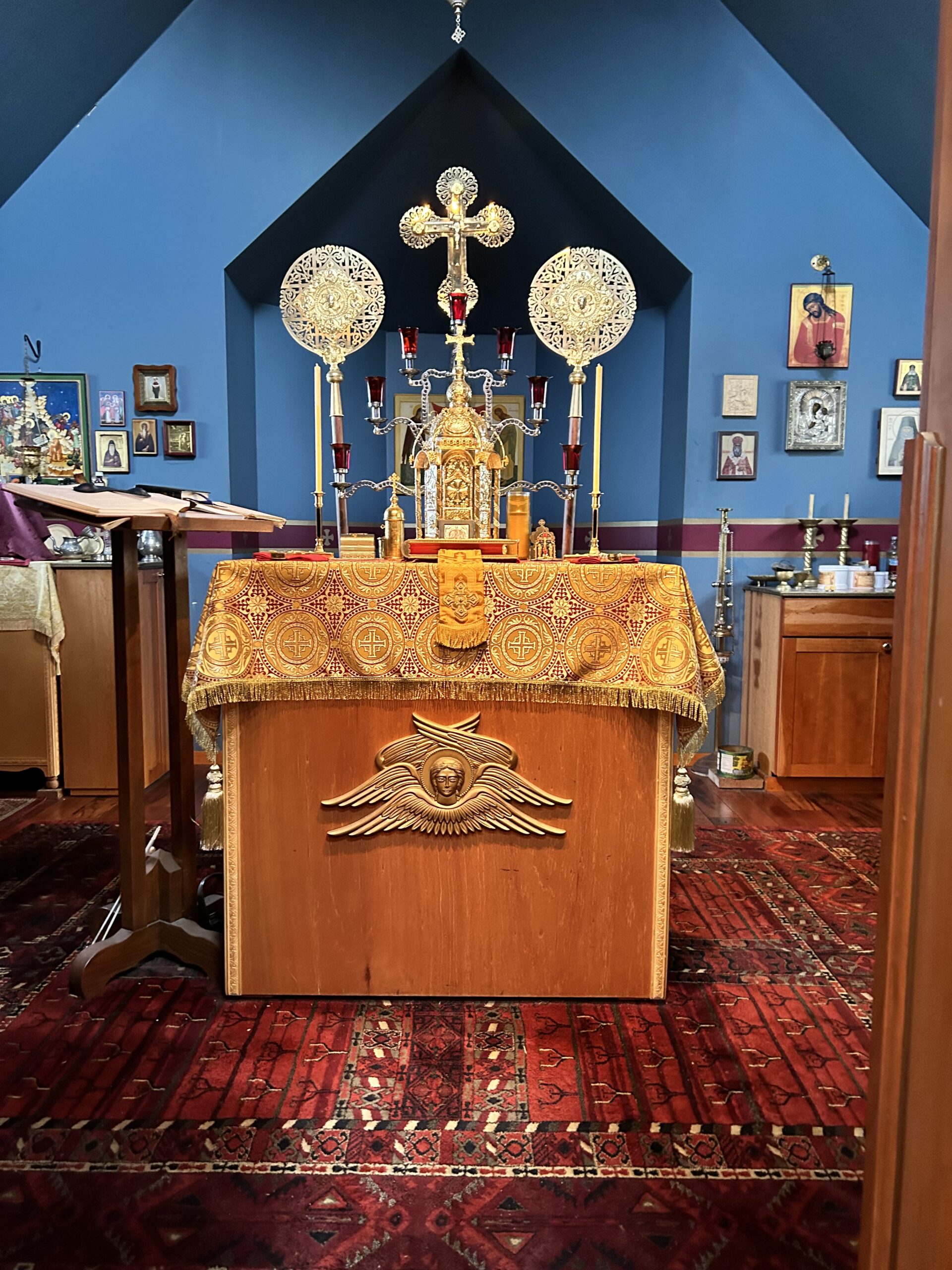The Word Eucharist is a Greek Word Meaning “Thanksgiving”

It has become the practice in America for many Orthodox Christians to gather in our temples for the celebration of the Divine Liturgy on Thanksgiving Day, for what better way to give thanks to God than to celebrate the service whose very word (Eucharist) means thanksgiving. As we gather together with friends and family, sharing in the traditional turkey dinner, we remember that this great country has set aside Thanksgiving Day, not as a day to overeat, but as a day when we come together as family.
The central service in the Orthodox Church is the Divine Liturgy, and since the word liturgy means the “work of the people”, the centrality of this service is all the more important, for it involves us all in a most intimate way. The people of God, who make up the Body of Christ, come together to celebrate the Eucharist, and receive the very Body and Blood of our Saviour. This very Christ condescended to take on our flesh, and condescends, again, to unite Himself to His creation, in each celebration of the Divine Liturgy.
The word Eucharist comes from the Greek by way of Latin, and it means “thanksgiving”, and is, by its very nature, a meal of unity whereby we leave our isolated lives and come together around the table of the Lord. We are mystically joining in the Heavenly Banquet that is ongoing, and celebrated in the heavenly realm. This celebration of the Divine Liturgy is not an isolated event, but a Meal of Unity.
We Orthodox, perhaps more than most, understand the profound importance of the unity of coming together as one, as we set aside, if even for a day, lives set apart. We come together to celebrate the Liturgy, which is “the work of the people”, giving thanks to the Lord for yet another year of blessings.
Happy Thanksgiving to all of you.
Love in Christ,
Abbot Tryphon
Photo: The new Six-Winged Seraphim on the front of the Holy Table.
Thursday November 23, 2023 / November 10, 2023
25th Week after Pentecost. Tone seven.
Apostles Erastus, Olympas, Herodion, Sosipater, Quartus, and Tertius of the Seventy (1st c.).
New Hieromartyr Niphont and Martyr Alexander (1931).
New Hieromartyrs Prokopius (Titov) archbishop of Odessa, Dionisius, John and Peter priests (1937).
New Hieromartyrs Augustine (Belyaev), archbishop of Kaluga (1937) and with him John priest, New Hieromartyrs Ioanicius, Martyr Alexis, Appolon, Michael (1937).
Martyr Nicholas and Virgin-martyr Anna and St. Boris deacon confessor (1930-1940).
Virgin-martyrs Olga (1941) and Theoctista (1942).
Martyr Orestes of Cappadocia (304).
Hieromartyr Milos (Miles), bishop in Persia (341), and two disciples.
Venerable Theocteristus, abbot of Symbola on Mt. Olympus.
Martyr Constantine, grand prince of Kartli, Georgia (852).
Commemoration of the torture of Great-martyr George in 303. (Georgia).
St. Nonnus, bishop of Heliopolis (471).
Translation of the relics of St. Gregory, presbyter, in Assos of Lesbos (Greek).
St. Eucharius, first bishop of Trier (3rd c.).
The Scripture Readings
2 Thessalonians 2:13-3:5
Stand Fast
13 But we are bound to give thanks to God always for you, brethren beloved by the Lord, because God from the beginning chose you for salvation through sanctification by the Spirit and belief in the truth, 14 to which He called you by our gospel, for the obtaining of the glory of our Lord Jesus Christ. 15 Therefore, brethren, stand fast and hold the traditions which you were taught, whether by word or our epistle.
16 Now may our Lord Jesus Christ Himself, and our God and Father, who has loved us and given us everlasting consolation and good hope by grace, 17 comfort your hearts and establish you in every good word and work.
Pray for Us
3 Finally, brethren, pray for us, that the word of the Lord may run swiftly and be glorified, just as it is with you, 2 and that we may be delivered from unreasonable and wicked men; for not all have faith.
3 But the Lord is faithful, who will establish you and guard you from the evil one. 4 And we have confidence in the Lord concerning you, both that you do and will do the things we command you.
5 Now may the Lord direct your hearts into the love of God and into the patience of Christ.
Luke 13:1-9
Repent or Perish
13 There were present at that season some who told Him about the Galileans whose blood Pilate had mingled with their sacrifices. 2 And Jesus answered and said to them, “Do you suppose that these Galileans were worse sinners than all other Galileans, because they suffered such things? 3 I tell you, no; but unless you repent you will all likewise perish. 4 Or those eighteen on whom the tower in Siloam fell and killed them, do you think that they were worse sinners than all other men who dwelt in Jerusalem? 5 I tell you, no; but unless you repent you will all likewise perish.”
The Parable of the Barren Fig Tree
6 He also spoke this parable: “A certain man had a fig tree planted in his vineyard, and he came seeking fruit on it and found none. 7 Then he said to the keeper of his vineyard, ‘Look, for three years I have come seeking fruit on this fig tree and find none. Cut it down; why does it use up the ground?’ 8 But he answered and said to him, ‘Sir, let it alone this year also, until I dig around it and fertilize it. 9 And if it bears fruit, well. But if not, after that you can cut it down.’ ”
